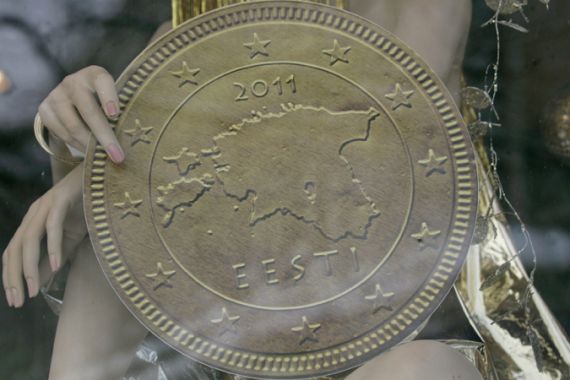Estonia makes change for euro
The Baltic state will introduce the euro in 2011, amidst fear from much of the public.

 |
| A label reads ‘Euro will not increase the prices’ as Estonia prepares to change currency at midnight [AFP] |
There are epic New Year’s resolutions in store for Estonia when it becomes the 17th country to adopt the euro as its currency.
At the strike of midnight, this Baltic state will officially bid farewell to the kroon, and Prime Minister Andrus Ansip will mark the historic moment by withdrawing a euro bank note from an automatic teller at the national opera house in the capital city Tallinn.
Estonia’s centre-right government says the switch is an important signal to investors and will make life easier for businesses with 80% of Estonia’s trade being within the 27-nation European Union.
President Toomas Hendrik Ilves said, post-Soviet, Estonia’s policy has always been to anchor itself in the West. The country entered the EU and NATO in 2004.
“Joining the eurozone in January 2011 will mean arriving in Europe again,” Ilves told AFP.
Economists generally believe that Estonia, which has emerged from its worst economic crisis, will benefit from having the euro. A brutal recession in 2009 knocked almost a fifth off the country’s GDP; it will be the poorest member of the eurozone.
‘Welcome to the Titanic’
Although pitched by the government as economic good sense despite the eurozone’s turmoil, local surveys put the approval rate at half the population, with almost 40 percent of Estonians opposed to the move.
View Eurozone nations in a larger map
“Estonia! Welcome to the Titanic,” read posters euro opponents have plastered near the opera house, likening the eurozone to the sunken cruise-ship, and highlighting the debt crises which have plagued other eurozone members.
The switch comes at a time of profound crisis with Europe’s common currency.
The euro has taken a hammering this year – reeling from one crisis to another; Greece and Ireland required emergency bailouts earlier this year to prevent their economies from slipping into insolvency.
Portugal, Spain, Belgium and Italy are also considered to be in possible danger zones.
Pollsters in Estonia flag up concerns about price hikes and nostalgia for the kroon, which was born in 1992, the year after the country won freedom from the crumbling Soviet Union, which had taken it over during World War II.
Anna Baljuk, a market stall owner in Tallinn, was concerned about the move. “I don’t see what good the euro will bring, and I’m concerned that the problems in the eurozone might harm Estonia’s economy,” she said.
Crisis of Confidence
After Slovenia and Slovakia, Estonia will be the third East European country using the euro.
Seven others in the region – Poland, Romania, Hungary, Czech Republic, Bulgaria, Lithuania and Latvia – are also required to phase in the euro as part of European Union membership. But the deepening crisis of confidence is likely to cause delays.
“There are more risks to being in the euro zone than being outside,” Polish central bank governor Marek Belka said earlier this month.
Similar sentiments have come from the Czech Republic, where Prime Minister Petr Necas has said adopting the euro would not be to the country’s advantage for a long time. “The Czechs have always been more cautious and the Poles are getting more cautious too,” said Capital Economics economist Neil Shearing.
Even if the euro zone survives in its current form, he said, the next new entrant would not be until 2015. Many economists now expect the larger eastern Europeans will not join before the end of the decade.
Greater Stability
However, looking beyond the single currency zone’s woes, the Baltic region is hoping euro membership will in time confer greater political and economic stability after the recent financial crisis.
“Over the longer term there are less risk of uncertainties and instability in the euro area than in the Baltic region and thus this should be positive for Estonia, despite the short-term challenges,” said Nordea analyst Annika Lindblad.
The Estonian Finance Ministry has said the country’s banks and IT-systems were prepared to cope with the coming changeover as hundreds of ATM-machines were being loaded with euro notes.
Selected bank branches and postal offices were scheduled to stay open over the weekend to accommodate the switch, but police urged citizens not to rush about with large amounts of cash due to robbery risks.